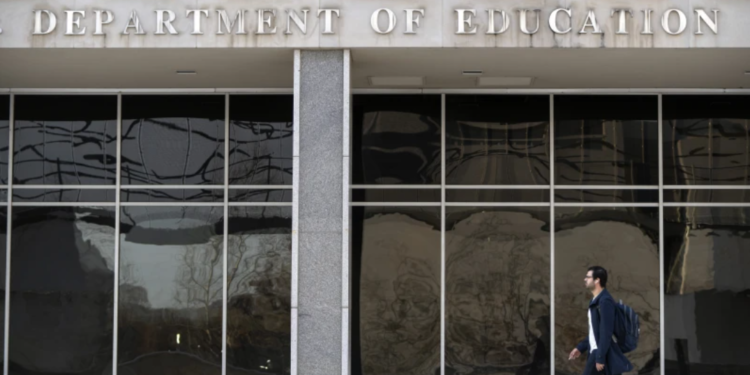March 14, 2025 Story by: Editor
Education in the United States, spanning from early childhood programs to higher education, is predominantly financed and managed at the state and local levels. The federal government, while playing a smaller financial and operational role in K-12 and postsecondary education, remains essential in ensuring students’ access to quality educational opportunities and preparing a skilled workforce and engaged citizenry.
The U.S. Department of Education (ED) is responsible for overseeing and administering major federal education programs, in addition to fulfilling its other legislatively mandated functions. As of May 2024, ED employs 4,233 staff members, making it the smallest among the 15 Cabinet-level executive departments.
Despite its limited size and role, ED has frequently been the target of Republican-led efforts to reduce or eliminate it, dating back to Ronald Reagan’s call for its dissolution during its early years. However, since Congress has specifically delegated these responsibilities to ED through legislation, shifting them elsewhere would require legal amendments.
The president does not have the authority to dissolve ED, as it was established through congressional legislation. However, the current administration’s stance on whether it will operate within its designated powers remains unclear. This article provides an overview of the federal role in education and outlines how ED carries out its duties. A detailed FAQ document further explores the Trump administration’s potential actions concerning ED.
While the U.S. Constitution does not explicitly mention a federal role in education, its involvement has been shaped by decades of legislation, judicial decisions, and established practices. The federal government’s role includes providing financial support to enhance educational opportunities, safeguarding students’ civil rights, and fostering research and development to guide educational policies.
The modern U.S. Department of Education was established under the Department of Education Organization Act of 1979, which defined its fundamental structure and responsibilities. A key aspect of ED’s role is implementing federal education laws and programs, many of which predate its formation. Significant education legislation dates back to the Civil War and Reconstruction era, with the creation of land-grant and historically Black colleges. The earliest version of the Department of Education also emerged during this period.
A century later, President Lyndon B. Johnson’s “War on Poverty” led to the enactment of several pivotal federal education laws, including the Elementary and Secondary Education Act (ESEA) and the Higher Education Act (HEA) in 1965. These laws introduced programs such as Title I grants, Federal Pell Grants, and student loan initiatives to support K-12 and higher education institutions. In 1975, the Individuals with Disabilities Education Act (IDEA) was introduced to assist children with disabilities. Before the creation of the current ED, these programs were managed by the Department of Health, Education, and Welfare (HEW).
Congress not only enacts federal education laws but also allocates funding through the annual budget process. ED ensures the timely distribution of these funds and enforces compliance with congressional requirements. Some federal education programs are overseen by other agencies, such as Head Start (U.S. Department of Health and Human Services), the National School Lunch Program (U.S. Department of Agriculture), and the GI Bill (U.S. Department of Veterans Affairs).
Funding for Elementary and Secondary Education
Approximately 90% of public school funding comes from state and local governments, with the federal government contributing the remaining portion. During crises such as the Great Recession and the COVID-19 pandemic, federal contributions temporarily increased.
Federal funding for elementary and secondary education primarily supports disadvantaged students. Title I of ESEA, the largest federal funding stream, allocates $18.4 billion in FY 2024 to school districts based on poverty levels. IDEA, which provides assistance for students with disabilities, follows closely with $15.5 billion. Additional funding streams support teacher professional development (ESEA Title II), education for English Learners (ESEA Title III), and Impact Aid for districts with significant federal land ownership.
These programs allocate funds according to formulas set by Congress. ED does not determine individual district allocations but distributes funds based on predefined formulas, some of which are highly complex.
Funding for Postsecondary Education
Under HEA, Congress authorized various funding streams for higher education. Title II supports teacher education, while Title III funds minority-serving institutions. Title IV is the most significant funding mechanism, covering Pell Grants and Federal Work-Study programs.
Beyond student financial aid and institutional support, HEA also governs federal student loan programs. These programs help students invest in their education, recognizing that higher education generally leads to increased earnings and opportunities. Since private financial markets have historically fallen short in offering adequate student loans, federal intervention has been deemed necessary.
The Federal Student Loan Program, governed by HEA, provides crucial financial access for students across disciplines, including undergraduates, law, and medical students. Most loans issued through the program accrue interest, though some are subsidized. Currently, student loans are issued through the William D. Ford Federal Direct Loan Program and serviced by private entities. Before the 2010 expansion of the Direct Loan Program, the federal government guaranteed loans through the now-defunct Federal Family Education Loan (FFEL) program.
Borrowers have multiple repayment options, including income-driven repayment (IDR) plans that allow loan forgiveness after qualifying payments. The Public Service Loan Forgiveness Program (PSLF), created under the 2007 College Cost Reduction and Access Act, enables government and nonprofit workers to receive loan forgiveness after ten years. ED sets the regulations for these programs and collaborates with private loan servicers to implement them. The Biden administration introduced new regulations for the Saving on a Valuable Education (SAVE) plan, a more generous IDR initiative, alongside changes to PSLF and other IDR programs. However, these regulations face legal challenges, causing disruptions in the loan repayment system.
ED also manages the Free Application for Federal Student Aid (FAFSA), which determines eligibility for Title IV funds. Many states rely on FAFSA data to allocate state financial aid. The Office of Federal Student Aid (FSA) administers FAFSA, though persistent understaffing has led to operational difficulties. The FAFSA Simplification Act of 2020 aimed to streamline the application process, but technical challenges hindered its implementation, leaving many students struggling to complete their applications.
Federal Influence Over Education Through Funding Conditions
As the Constitution restricts the federal role in education, Congress and presidential administrations primarily exert influence by attaching conditions to federal funding. This practice has sparked controversy, particularly in relation to desegregation efforts. States, districts, and institutions must adhere to specific requirements to receive federal funds, and ED ensures compliance through regulations, data reporting, and audits.
For instance, Title I funds must support educational services for low-income students, while IDEA funds must be allocated for students with disabilities. Some argue that compliance requirements impose excessive bureaucratic burdens, while others contend that enforcement measures do not always achieve their intended outcomes.
Prior to the 2000s, federal K-12 funding primarily mandated compliance with civil rights laws. This changed with the No Child Left Behind (NCLB) Act of 2002, which required states to implement standardized testing and accountability measures in exchange for funding. Although states had discretion in designing their accountability systems, NCLB significantly expanded federal oversight of K-12 education. The Every Student Succeeds Act (ESSA), enacted during the Obama administration, scaled back these requirements, reducing federal mandates on test performance while maintaining state-level reporting obligations.
ED remains responsible for enforcing these rules, collecting required data, and overseeing how states allocate federal funds.
Source: Brookings

















